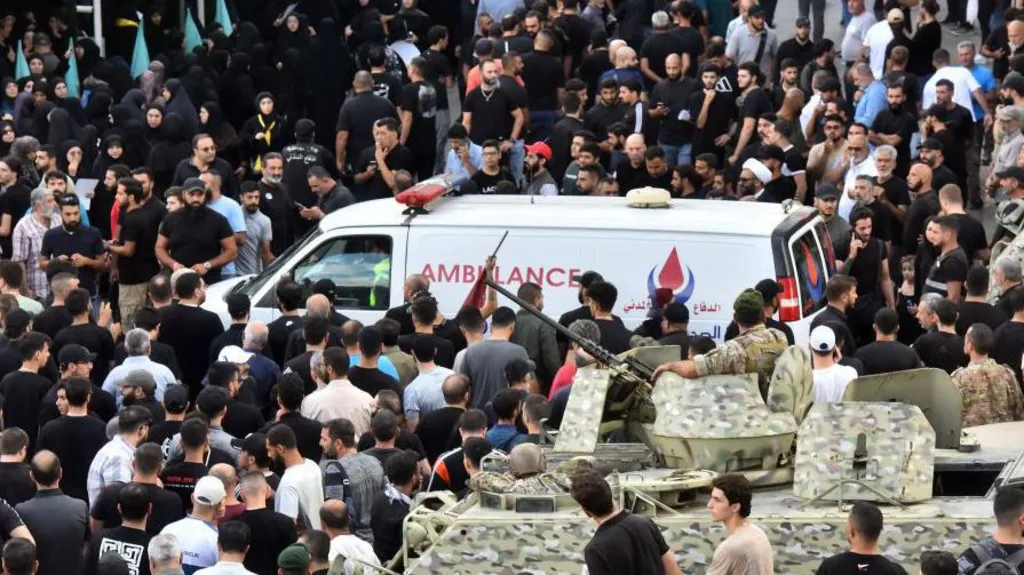Turmoil in Lebanon: Explosions Rock Dahiyeh Amid Grief
3 min read
At least one of the explosions took place during a funeral for those killed in Tuesday's pager explosions.

At least one of the explosions took place during a funeral for those killed in Tuesday's pager explosions.
Chaos erupted in Dahiyeh, Hezbollah’s stronghold in southern Beirut, just as mourners gathered for funerals following a devastating series of pager-bomb attacks. A fresh explosion interrupted the somber atmosphere, sending shockwaves through the crowd. Video footage captured the moment, revealing a scene of panic as people fled, some screaming, while a man lay motionless on the ground.
The blast occurred moments before the funerals were set to begin for an 11-year-old boy and three Hezbollah members who lost their lives in the previous day’s violence. The explosion shattered the already tense atmosphere, causing bewilderment among those gathered, who were still reeling from the earlier tragedy. Reports indicated that this latest explosion was part of a second wave targeting walkie-talkies, leaving no electronic devices deemed safe.
In the aftermath, Hezbollah supporters confronted our team, urging us to refrain from using phones or cameras, reflecting the heightened anxiety surrounding the events. Lebanese officials reported at least 20 fatalities and around 450 injuries nationwide, with fires igniting in numerous homes, shops, and vehicles across the country.
The latest attacks have been perceived as a significant blow to Hezbollah, raising suspicions that its communication networks may have been compromised by Israeli intelligence. This has led many to wonder what further escalation might follow in this volatile region.
The recent violence has left Lebanon shaken and angry. Just a day prior, thousands of pagers exploded in a coordinated assault, triggered by messages believed to have originated from Hezbollah. This unprecedented attack killed 12 people, including an eight-year-old girl and the 11-year-old boy, while injuring around 2,800 others. Dr. Elias Warrak described the day as “the worst of his life,” noting that many victims suffered severe injuries, with over 60% losing at least one eye and others experiencing extensive facial and brain injuries.
Reports suggest that a shipment of pagers was rigged with explosives and detonated remotely, a tactic that has sent shockwaves through the community. In an effort to evade detection from Israeli military and intelligence forces, Hezbollah had distributed these pagers, fearing that smartphones could be used to track and target its members. However, the specifics of how the recent attacks were executed remain unclear.
Hezbollah has publicly vowed to retaliate, placing the blame for the attacks squarely on Israel, although Israel has remained silent on the matter. As tensions rise, concerns grow that the ongoing violence between these two adversaries could escalate into a full-scale war, especially with tens of thousands of residents on both sides of the border already displaced.
Hezbollah’s operations against Israel, which began almost a year ago, have been framed as acts of solidarity with Palestinians in Gaza. The group has insisted that its activities will persist until a ceasefire is achieved, a goal that remains elusive. Mourners attending the funerals in Dahiyeh expressed a resilient spirit despite their pain. One young man remarked, “The pain is huge, both physical and emotional. But this is something we are used to; we will continue our resistance.” A 45-year-old woman added, “This will only make us stronger; those who have lost an eye will fight with the other eye, and we are united.”
In a sign of escalating tensions, Israeli Defense Minister Yoav Gallant stated that the country is “at the start of a new phase in the war,” as military forces reposition from Gaza to northern Israel. While Hezbollah has thus far indicated that it does not seek another major conflict, many in Lebanon feel that a war would not serve the country’s interests, which are already strained by a prolonged economic crisis.
However, the pressure for a decisive response from Hezbollah is palpable, and the group’s leader, Hassan Nasrallah, is expected to make a public statement that could reveal its plans in the wake of these tragic events. As Lebanon grapples with this turmoil, the path ahead remains fraught with uncertainty.